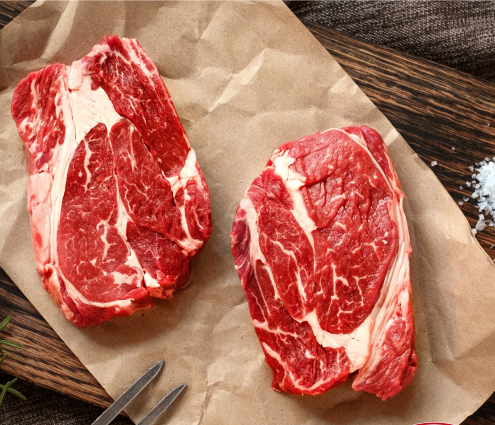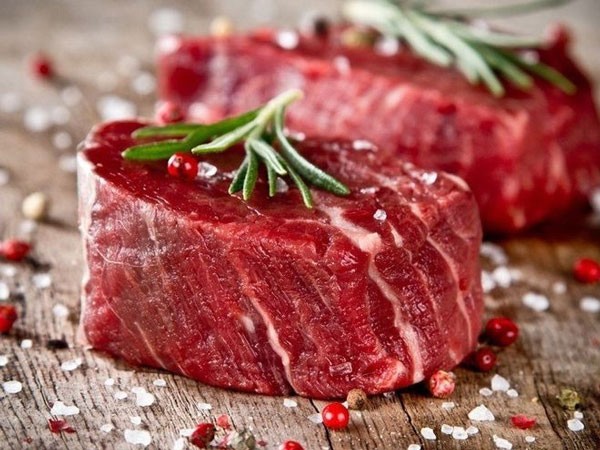Beef is a good source of protein, iron, zinc, vitamins and minerals in the diet. With high nutritional content, what are the benefits of eating beef?
Health benefits of beef
– Provides a large amount of L – Carnitine:
L-carnitine is an amino acid that occurs naturally in meat products. The body synthesizes L-carnitine in the liver and the process is based on the amino acids L-lysine and L-methionine. Diets high in L-carnitine have the following health effects:
Heart: L-carnitine has an impact on hypertension, oxidative stress, nitric oxide, and inflammation. The study also found that L-carnitine was associated with a 27% reduction in all-cause mortality in heart failure patients.
Diabetes: High L-carnitine intake in patients with type 2 diabetes improves fasting blood glucose levels and overall cholesterol levels.
– Provide Glutathione – the first-class antioxidant:
Glutathione is known for its effects:
– Against aging.
– Increased longevity.
– Prevention of diseases.
– Reduce the risk of chronic diseases.
– Improve immune system.
Glutathione helps protect every cell in our body from cellular damage, which can lead to many chronic diseases. On the other hand, a deficiency of glutathione contributes to oxidative stress and inflammation.

Beef has many health benefits.
– Helps to improve muscle mass:
Beef is high in health-promoting amino acids and is one of the largest sources of protein in the human diet. Protein is used by our bodies to repair and build bones, skin, and cartilage. Sufficient protein will help build and maintain lean muscle mass.
– Beef is extremely rich in minerals:
The mineral content of lean beef includes:
– Calcium 4%
– Dong 8%
– Iron 26%
– Magnesium 10%
– Manganese 2%
– Potassium 18%
– Phosphorus 38%
– Selenium 52%
– Zinc 72%
– Prevent anemia:
Iron deficiency is one of the most common causes of anemia. The main symptoms include fatigue and weakness. Beef is a rich source of iron, mainly in the form of heme iron, which the body absorbs heme iron much more efficiently than non-heme iron.
Some research shows that beef can increase non-heme iron absorption even at meals containing phytic acid, an iron absorption inhibitor.
Contains Carnosine – a powerful amino acid:
Carnosine (beta-alanyl-L-histidine) is an amino acid found throughout the body and has several important roles in human health. Carnosine has anti-glycosylation properties or more precisely carnosine reduces the harmful effects of a process called “glycation”.
Glycation is central to the aging process and gradually damages the body, potentially leading to atherosclerosis and other chronic diseases.
In addition, carnosine helps strengthen the immune system and reduce inflammation. Amino acids are also thought to help prevent lipid peroxidation in our cells.
Beef is rich in vitamins:
Vitamin content in beef (% RDA):
– Vitamin B12: 82%
– Vitamin B3: 50%
– Vitamin B6: 36%
– Vitamin B2: 18%
– Vitamin B5: 14%
Beef also contains a small amount of vitamin E and vitamin K. When it comes to vitamins in beef, it must be mentioned that it contains a large amount of vitamin B12. Vitamin B12 (cobalamin) is a remarkable essential nutrient that has many benefits in terms of improved skin, positive mood, better sleep, and nerve regeneration. Not enough vitamin B12 in the body can increase the risk of depression and mental problems.
Contains conjugated linoleic acid:
Conjugated linoleic acid is a naturally metabolised fat. According to research, conjugated linoleic acid improves insulin sensitivity promoting weight loss.
Contains high performance creatinine:
The health benefits of creatine include:
– Improve exercise performance.
Creatine supports muscle growth and development.
– Provides muscles with a greater source of energy and improves endurance.
– Increase muscle size.
The effect of beef for men?
Beef is low in fat, but has a rich combination of linoleic acid that acts as an antioxidant to maintain muscle mass.
Beef is rich in zinc and magnesium. Zinc plays an important role in helping protein synthesis, promoting muscle growth, anti-oxidant, enhancing reproductive function, improving male sexual weakness. Zinc, glutamate and vitamin B6 work together to strengthen the immune system.
Many scientific studies show that zinc in beef helps protect sperm from the bad effects of free radicals. Zinc also prevents the conversion of testosterone to estrogen (male to female), thereby boosting libido. Regular use of beef will help men increase the quality and quantity of sperm, thereby helping to improve the ability to “father” easily. But should also use a sufficient amount will help the body balance more effectively.
Is it good to eat a lot of beef?
Many studies show that each type of meat has its own uses and limitations. If used in moderation, they will help our body stay healthy. Similar to beef, if it is too much, it will bring a lot of bad things to health.
Causes cardiovascular disease: Scientists have proven a link between beef and the risk of cardiovascular disease for people who eat it if that person consumes too much. When beef is digested in the stomach, gut bacteria “unearth” a compound called carnitine. This substance will cause atherosclerosis, which has a very bad impact on the human cardiovascular system.
Increased risk of cancer: Beef and its link to cancer have long been talked about. Specific studies have shown that beef has the ability to cause colon cancer. An American study of nearly 150,000 people also found that eating a lot of beef significantly increased the risk of colon cancer. However, this only happens if you eat too much.
Increases the risk of Alzheimer’s disease: If you eat too much beef, you will have an excess of iron because beef contains a lot of iron. If normal, iron is very beneficial for health, good for blood, cardiovascular system and brain development. However, if there is an excess of iron, proteins present in the brain can break down nerve cells and destroy them. This is the root cause of Alzheimer’s disease.
Increases the risk of type 2 diabetes: In beef contains a lot of saturated fat – a type of bad fat that increases the risk of type 2 diabetes. Experts recommend limiting saturated fat intake, do not let this content exceed 7 % of total calories consumed daily. They believe that this is one of the important factors that cause diabetes.
In addition, eating rare or raw beef can cause liver fluke disease: this fluke usually parasitizes the liver and biliary tract of herbivorous animals such as buffaloes, cows, goats…

How much beef should you eat a week?
According to nutrition researchers, an average person should not eat more than 300-500g of beef per week. And a week should not eat more than 2-3 times, (serving 100-150g / meal, depending on weight and fat level to increase or decrease appropriately), and it is best to boil meat, stew meat.
at Blogtuan.info – Source: Eva.vn – Read the original article here



